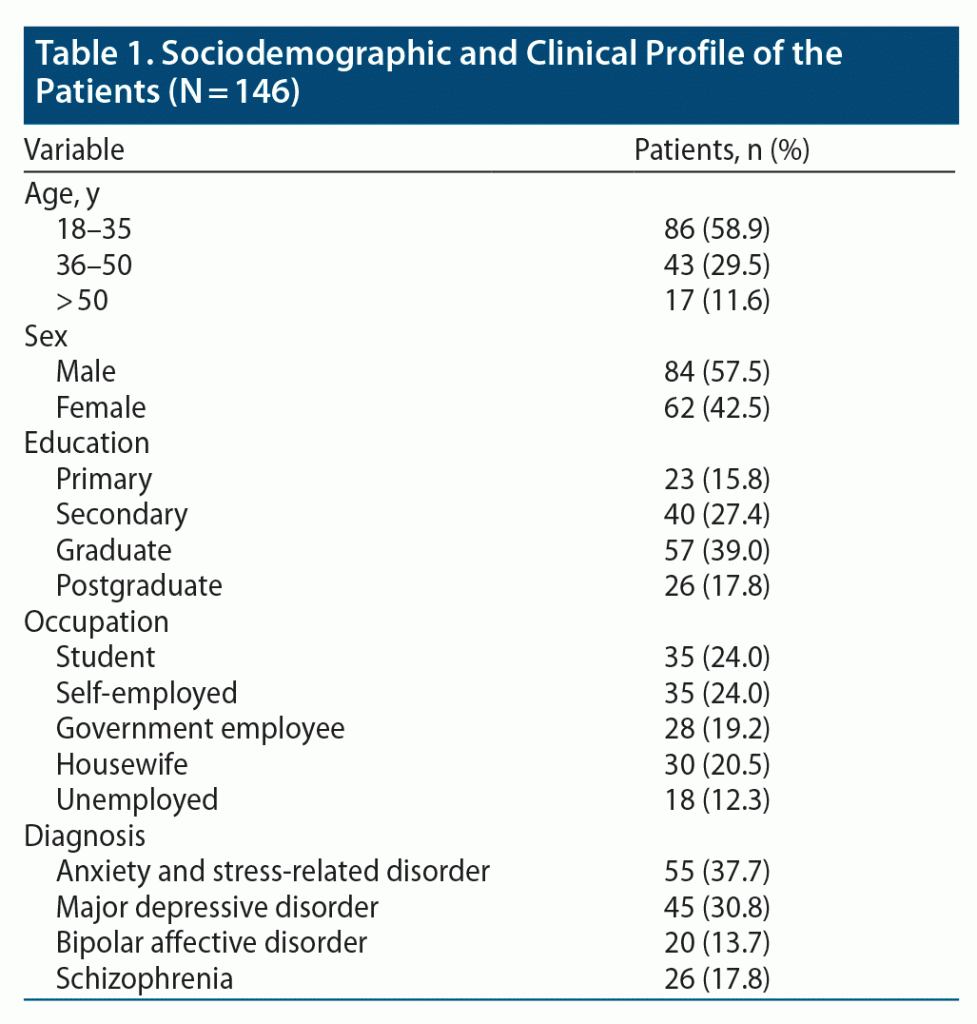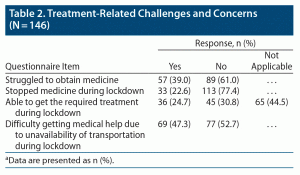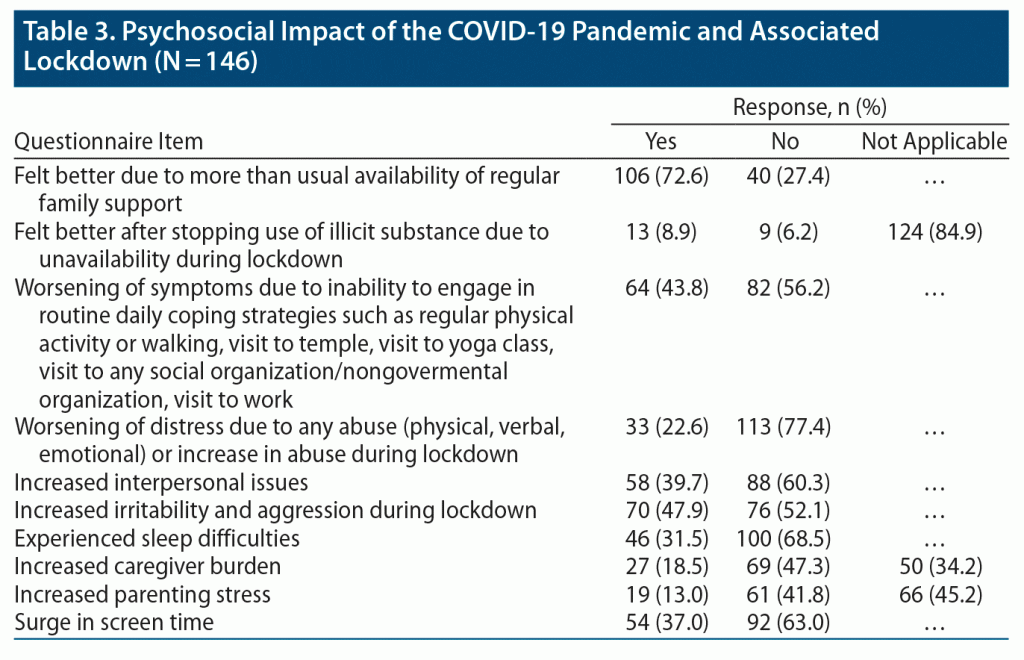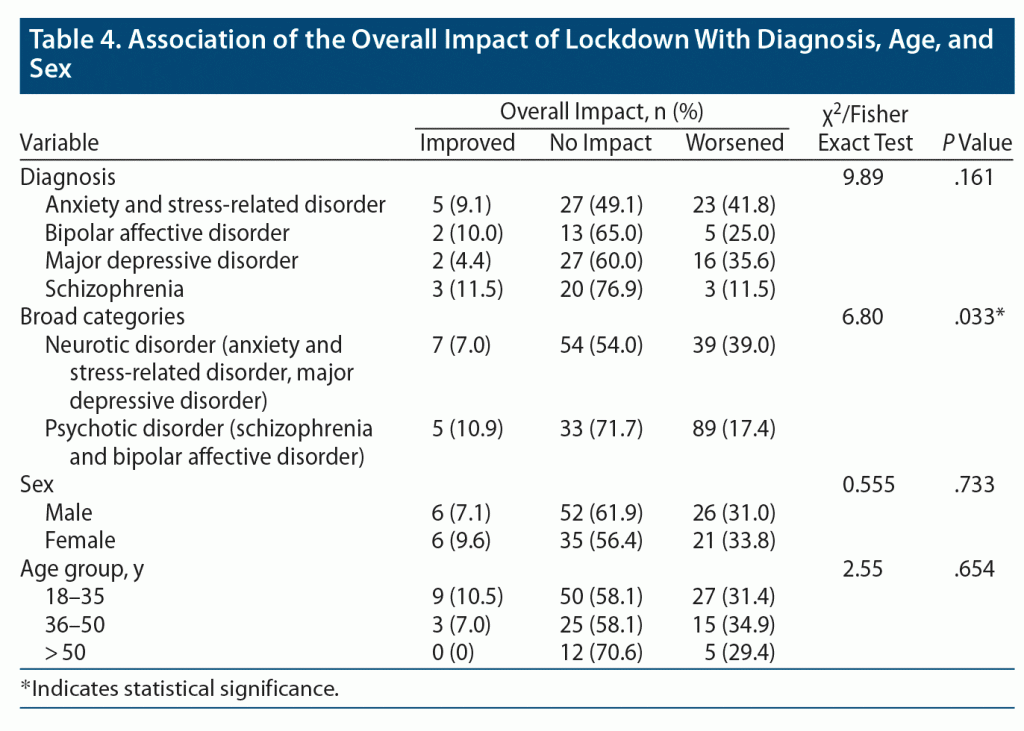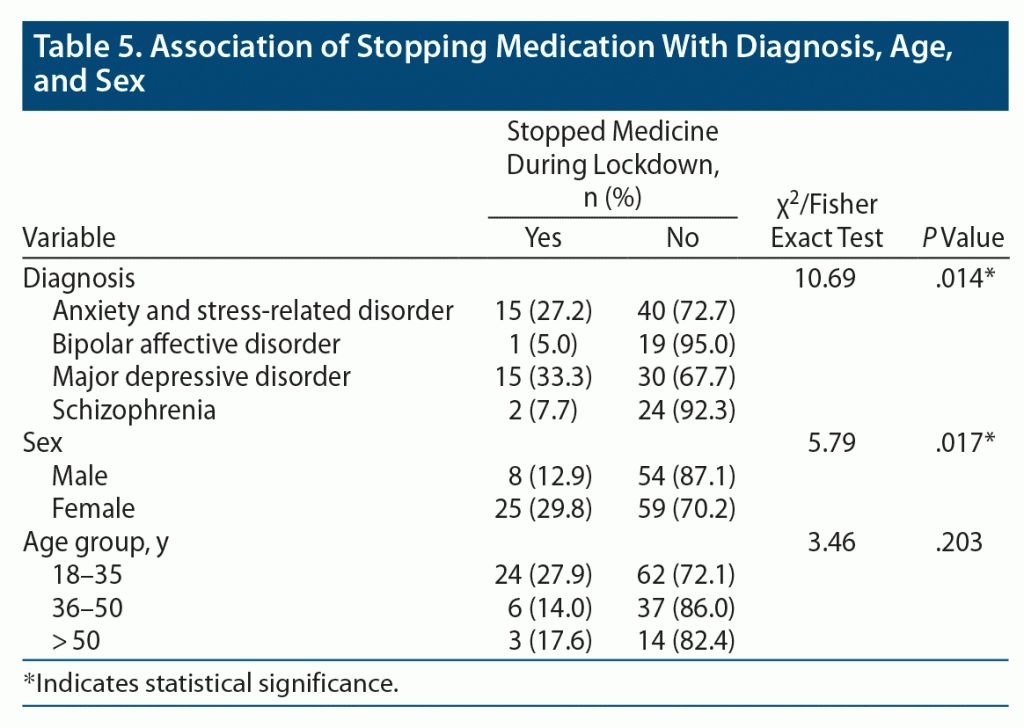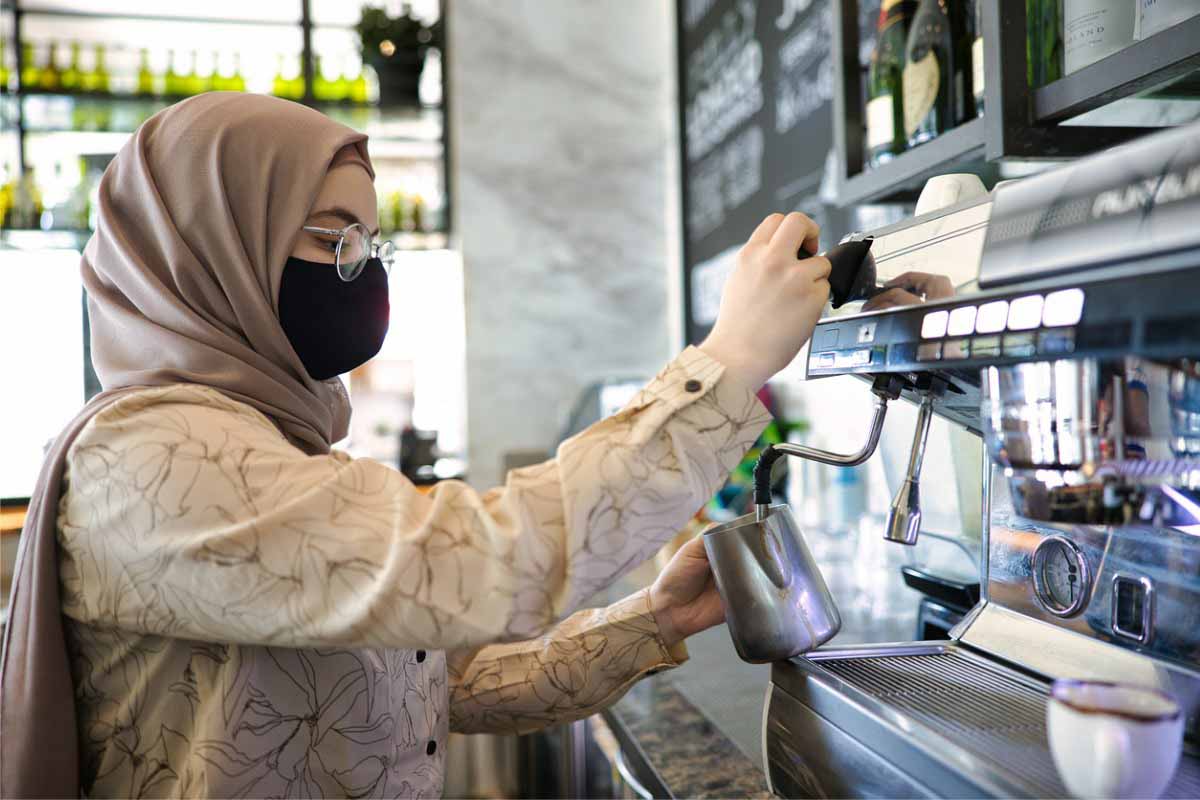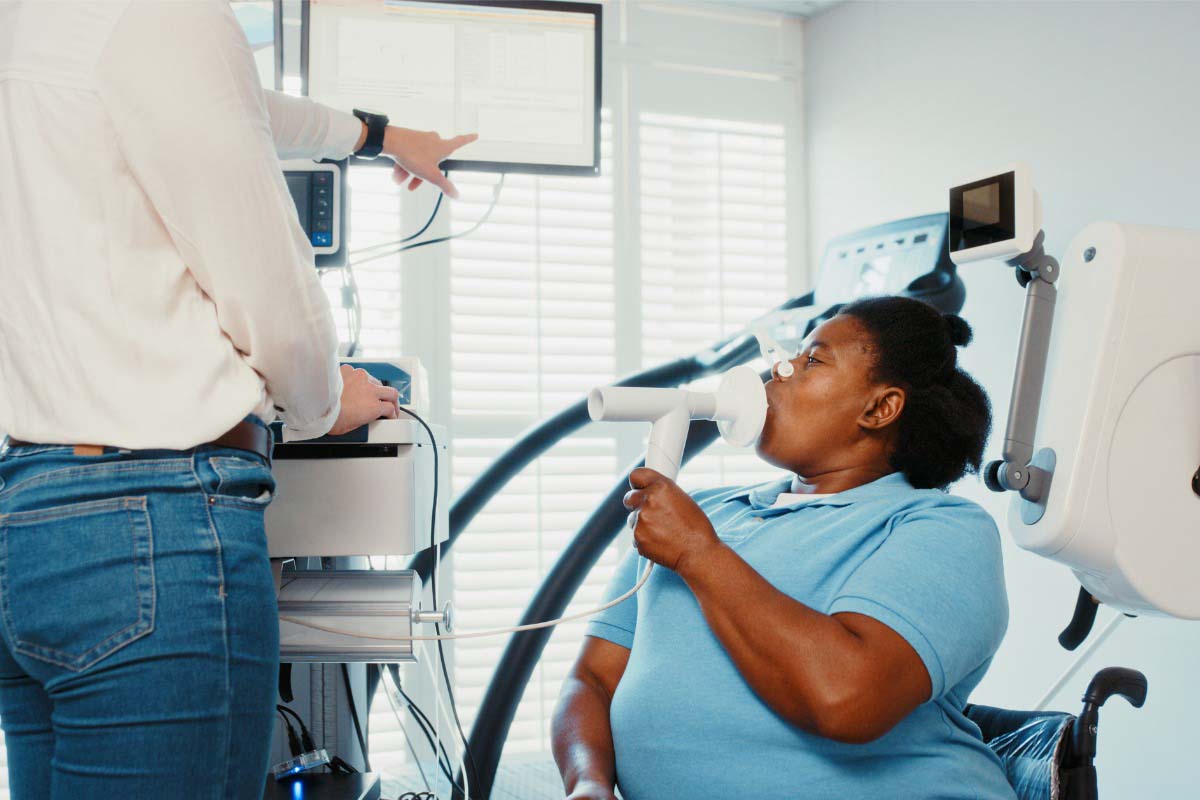ABSTRACT
Objective: To explore the psychological impact of the coronavirus disease 2019 (COVID-19) pandemic and associated lockdown on patients with psychiatric illness.
Methods: An online survey–based cross-sectional study was conducted among patients receiving follow-up treatment at a tertiary care center from January to March 2020. The data were collected using a questionnaire about the possible challenges in 3 broad areas: treatment-related challenges, psychosocial difficulties, and concerns related to COVID-19.
Results: The majority of patients (72.6%) reported a positive impact due to the increased availability of family support. Patients with depression and anxiety disorders (39.0%) experienced a more negative impact compared to those with psychotic disorders. Many of the psychiatric patients (22.6%) stopped medications and had difficulties accessing health services. Patients also experienced increased interpersonal conflict, sleep difficulties, and a surge in screen time.
Conclusions: The findings highlight the difficulties faced by patients with psychiatric illnesses and emphasize the importance of family cohesion during times of crisis.
Prim Care Companion CNS Disord 2022;24(5):22m03311
To cite: Gupta T, Swami MK, Choudhary S, et al. Psychological impact of the COVID-19 pandemic and associated lockdown on outpatients with psychiatric illness: a cross-sectional study. Prim Care Companion CNS Disord. 2022;24(5):22m03311.
To share: https://doi.org/10.4088/PCC.22m03311
© 2022 Physicians Postgraduate Press, Inc.
aDepartment of Psychiatry, All India Institute of Medical Sciences, Jodhpur, India
*Corresponding author: Tanu Gupta, MPhil, PhD, Department of Psychiatry, All India Institute of Medical Sciences, Jodhpur, India ([email protected]).
The fear, uncertainty, and social isolation associated with coronavirus disease 2019 (COVID-19) have taken a toll on the mental health of individuals worldwide. Anxiety, depression, and posttraumatic stress are cited as a consequence of COVID-19.1 The psychological impact of the pandemic can be substantial for patients with psychiatric illness due to their illness-associated functional disability, poor insight, and cognitive impairment.2,3 The preventive measures (such as repetitive hand washing and social isolation) have also contributed to the worsening of symptoms, especially among patients with anxiety disorders.1,4 Furthermore, stable psychiatric patients may experience a relapse or worsening of symptoms due to the ongoing pandemic.5 The unavailability of regular therapeutic services and support from mental health professionals has also contributed to increased caregiver burden. Therefore, it is imperative to understand patient/participant concerns. The present study assessed the psychological impact of the COVID-19 pandemic and associated lockdown on patients with psychiatric illness.
METHODS
The study utilized a cross-sectional design with a mixed-method (quantitative and qualitative) approach to data collection. Patients receiving active consultation from the psychiatry outpatient department from January 2020 to March 2020 (before COVID-19) were approached to participate in the study and were enrolled as participants.
Assessment
The assessment was conducted using a self-designed questionnaire specifically developed by the authors, utilizing the method of focused discussion with patients, caregivers, and mental health professionals about challenges related to lockdown and COVID-19. The main components of the questionnaire were divided into 3 broad areas: treatment-related challenges (4 items), psychosocial difficulties (13 items), and concerns related to COVID-19 (9 items). To assess these areas, questions were prepared and further reviewed by mental health experts. The questionnaire included a total of 31 items (28 multiple-choice and 3 open-ended questions). A self-administered Google form was prepared for data collection. The patients who filled out the Google form were contacted for a semistructured telephone interview comprised of the 3 open-ended questions developed by the authors. The interview was conducted by a psychiatrist.
Procedure
After obtaining clearance from the institute ethics committee, the study was conducted following the first wave of COVID-19 when the vaccine was unavailable. A list of patients who attended the psychiatry outpatient department from January to March 2020 (N = 2,572) was retrieved from the electronic medical record of the hospital. All patients aged > 18 years or informants were approached to participate in the study. A total of 1,025 patients were contacted through WhatsApp, of which 150 participated in the survey between September and November 2020. The rest of the patients could not be contacted due to an invalid WhatsApp number. Informed consent was taken through digital mode. Clinicians interviewed participants via telephone to complete the qualitative portion of the questionnaire.
Statistical Analysis
The quantitative data of the questionnaire were analyzed using SPSS version 21.0. In addition to descriptive statistics (mean, standard deviation, percentages), the association of diagnostic categories with age and sex was examined through χ2 and Fisher exact test. The significance level was set at < .05. Thematic analysis was conducted for qualitative responses.
RESULTS
Sample Description
The mean ± SD age of the patients was 34.6 ± 13.0 years. Most of the patients were male, graduates, and employed. Patients with a diagnosis of depression, anxiety, and stress-related disorders constituted the majority (68.5%) (Table 1).
Treatment-Related Challenges
Among treatment-related challenges, the most common difficulty reported was getting transportation for medical help (47.3%) followed by obtaining medications (39.0%). Many participants also stopped taking medicine during the lockdown (22.6%) (Table 2).
Psychosocial Impact of the COVID-19 Pandemic and Associated Lockdown
Most patients (72.6%) felt better due to more than usual availability of regular family support during the lockdown. Nearly half of the patients reported COVID-related concerns such as fear of infection (50.7%), uncertainty (58.2%), and loneliness due to social distancing (51.4%). The main contributors to stress were financial burden (28%), loss of job (25%), and increased burden of household chores (29%). Some patients also experienced worsening of symptoms due to their inability to engage in daily coping strategies (43.8%) and unavailability of family support (25.3%). Table 3 provides results of the psychosocial impact portion of the questionnaire.
Overall Impact of COVID-19 and the Associated Lockdown
Most participants reported no overall impact of the COVID-19 pandemic and lockdown on existing psychiatric illness, while 32% reported worsening, and 8% reported improvement. Further analysis revealed no association of overall impact of COVID-19 with demographic variables. However, a significantly higher proportion of patients with neurotic disorders (39.0%) experienced worsening of symptoms (P = .033) compared to patients with a psychotic disorder (17.4%) (Table 4).
The effect of diagnosis, age, and sex on response to individual survey items was found to be statistically insignificant (P > .05) except for medication adherence. A higher proportion of patients with anxiety disorders and depression stopped medication during lockdown compared to those with schizophrenia or bipolar disorder (P = .014). Similarly, a significantly higher proportion of women stopped medication during the lockdown (P = .017) (Table 5).
Qualitative Findings: Difficulties Faced in Seeking Medical Help
Most of the patients reported difficulties in seeking medical help during this period; therefore, they continued to take medications prescribed to them before the lockdown. In case of worsening of symptoms despite ongoing treatment, a few patients sought help from nearby functional health facilities and through the hospital’s telepsychiatry services. Those who had contact numbers of their treating doctor received better care.
Challenges to Obtaining Treatment
Patients reported various challenges such as unfamiliarity with the telepsychiatry services, complexity of the process involved in making appointments, and the long waiting period for an appointment. A few participants were satisfied with the services provided through telepsychiatry consultations, while others wanted the outpatient department services to function as before. Most participants believed that listening to and discussing their problems with mental health professionals could help them overcome stress.
Other Concerns
Three participants reported new onset of suicidal thoughts, while 7 reported worsening of preexisting suicidal thoughts due to their inability to access medical services, lack of financial stability, and worsening of symptoms.
DISCUSSION
The results of this study revealed both a positive and negative psychological impact of COVID-19. The majority of patients reported no overall impact of COVID-19 because of the increased availability of family members during the lockdown. Social support has been well documented as a protective factor for patients with psychiatric illness.6 Similarly, patients who were able to share their concerns with family and friends reported less worsening of their preexisting psychiatric condition.7 The positive influence of the pandemic has not been well examined so far, and it is possible that this finding could be more applicable to South Asian societies, which are less individualistic. However, this finding requires further cross-cultural exploration for validation, as the psychological impact of COVID-19 lockdowns has been reported to be heterogenous.8–10
Psychological Impact of COVID-19 and the Associated Lockdown
The patients felt more vulnerable due to their inability to engage in routine coping strategies. A few patients also experienced increased distress due to an increase in abuse (physical, verbal, emotional), as victims of abuse were spending the whole day with their perpetrators during the lockdown. However, the association of abuse with sex and diagnosis remained insignificant, which is inconsistent with existing literature reporting women as the main victim of abuse during COVID-19.11 Most data regarding increased abuse are possibly that of the general population, but in patients with mental illness, abuse is reported among both males and females.12,13
The patients in this study also experienced increased irritability and aggression, which might have contributed to increased interpersonal conflicts. Sleep difficulties and a surge in screen time were also observed, which might have contributed to worsening of symptoms. A positive association between mental health problems and increased screen time and frequent exposure to social media during the COVID-19 pandemic has been reported.14,15 Nearly half of the patients in our study experienced the direct impact of COVID-19 in the form of loneliness, uncertainty, and fear of infection or quarantine. They were stressed due to financial burden, restricted availability of essential items, job loss, and increased burden of household chores. Similar difficulties were reported among the general population in other studies.16,17 Although our study did not compare participants with the general population, a population-based study18 from Germany reported that patients with psychiatric illness are less affected by COVID-related concerns compared with the general population.
Impact on Neurotic Versus Psychotic Illness
Patients with neurotic disorders reported more worsening of symptoms that can be attributed to poor adherence to treatment and higher functionality in comparison to patients with a psychotic disorder. Also, patients with neurotic disorders are likely to have more sensitivity toward anxiety-provoking situations like COVID-19. A recent study19 also reported a negative impact of COVID-19 on patients with neurotic illnesses. Another study20 found that patients with anxiety disorders have been more affected during the pandemic. Similarly, the impact of the previous swine flu pandemic was more pronounced for patients with neurotic illness and somatoform disorder.21
Treatment-Related Challenges
Accessibility to the medical facility was the major challenge, as transport was restricted. Many patients remain unable to access any medical service due to unfamiliarity with the telepsychiatry services and lack of transportation. Furthermore, even after teleconsultation, a disrupted supply chain could have also restricted the availability of medications locally. During the pandemic, many patients utilized telepsychiatry services. A few patients were satisfied with telepsychiatry consultations, while others wanted the outpatient services to function as before. The reasons for dissatisfaction with telepsychiatry were technical issues, the complexity of the process involved in making appointments for telepsychiatry, and a long waiting period for an appointment, which has also been highlighted in the literature.22–24 Lack of in-person counseling/interaction with mental health professionals was another reason for dissatisfaction with telepsychiatry, as most patients reported feeling better after discussing their problems with mental health professionals, which was highlighted in the telephone interview.
This study has several limitations, as the findings cannot be generalized due to its small sample size and limited study population (use of only WhatsApp). Furthermore, the results are likely to be influenced by the possibility of both nonresponse and recall bias. A higher dropout rate in a psychiatric setting can be a reason for a lower response rate, as it is possible that only the patients who were willing to continue treatment at our center responded.
Despite these limitations, the biggest strength of the study is that it reflects the first-hand experiential account of patients regarding the impact of the COVID-19 pandemic and associated lockdown. Also, the study utilized a mixed approach of data collection that provides more validation for the findings and gives insight into the perspective of patients with psychiatric illness.
CONCLUSION
This study revealed a positive effect of COVID-19 in addition to the negative impact on psychiatric illnesses. Coping with the crisis of COVID-19 together might have enhanced family cohesion and connectedness. The findings of the study can be utilized as preliminary data to understand patients’ concerns and challenges and plan appropriate interventions during current and future pandemics.
Submitted: April 22, 2022; accepted July 19, 2022.
Published online: September 15, 2022.
Relevant financial relationships: None.
Funding/support: None.
Clinical Points
- COVID-19 has had a negative impact on patients with psychiatric illness.
- Experience of anxiety related to COVID-19 among patients with psychiatric illness was similar to that of the general population.
- Patients with neurotic illness were more adversely affected by the COVID-19 pandemic and related lockdowns than those with psychotic illness.
- Presence of increased family support can possibly minimize the adverse impact of pandemics.
References (24)

- Chatterjee SS, Barikar C M, Mukherjee A. Impact of COVID-19 pandemic on pre-existing mental health problems. Asian J Psychiatr. 2020;51:102071. PubMed CrossRef
- Muruganandam P, Neelamegam S, Menon V, et al. COVID-19 and severe mental illness: impact on patients and its relation with their awareness about COVID-19. Psychiatry Res. 2020;291:113265. PubMed CrossRef
- Hamada K, Fan X. The impact of COVID-19 on individuals living with serious mental illness. Schizophr Res. 2020;222:3–5. PubMed CrossRef
- Duan L, Zhu G. Psychological interventions for people affected by the COVID-19 epidemic. Lancet Psychiatry. 2020;7(4):300–302. PubMed CrossRef
- Roy A, Singh AK, Mishra S, et al. Mental health implications of COVID-19 pandemic and its response in India. Int J Soc Psychiatry. 2021;67(5):587–600. PubMed CrossRef
- Brinker J, Cheruvu VK. Social and emotional support as a protective factor against current depression among individuals with adverse childhood experiences. Prev Med Rep. 2016;5:127–133. PubMed CrossRef
- Gobbi S, Płomecka MB, Ashraf Z, et al. Worsening of preexisting psychiatric conditions during the COVID-19 Pandemic. Front Psychiatry. 2020;11:581426. PubMed CrossRef
- Kølbæk P, Jefsen OH, Speed M, et al. Mental health of patients with mental illness during the COVID-19 pandemic lockdown: a questionnaire-based survey weighted for attrition. Nord J Psychiatry. 2022;76(5):338–347. PubMed CrossRef
- Oppenauer C, Burghardt J, Kaiser E, et al. Psychological distress during the COVID-19 pandemic in patients with mental or physical diseases. Front Psychol. 2021;12:703488. PubMed CrossRef
- Prati G, Mancini AD. The psychological impact of COVID-19 pandemic lockdowns: a review and meta-analysis of longitudinal studies and natural experiments. Psychol Med. 2021;51(2):201–211. PubMed CrossRef
- Sifat RI. Impact of the COVID-19 pandemic on domestic violence in Bangladesh. Asian J Psychiatr. 2020;53:102393. PubMed CrossRef
- Sánchez OR, Vale DB, Rodrigues L, et al. Violence against women during the COVID-19 pandemic: an integrative review. Int J Gynaecol Obstet. 2020;151(2):180–187. PubMed CrossRef
- Oram S, Trevillion K, Feder G, et al. Prevalence of experiences of domestic violence among psychiatric patients: systematic review. Br J Psychiatry. 2013;202(2):94–99. PubMed CrossRef
- Fegert JM, Vitiello B, Plener PL, et al. Challenges and burden of the coronavirus 2019 (COVID-19) pandemic for child and adolescent mental health: a narrative review to highlight clinical and research needs in the acute phase and the long return to normality. Child Adolesc Psychiatry Ment Health. 2020;14(1):20. PubMed CrossRef
- Gao J, Zheng P, Jia Y, et al. Mental health problems and social media exposure during COVID-19 outbreak. PLoS One. 2020;15(4):e0231924. PubMed CrossRef
- Smith L, Jacob L, Trott M, et al. The association between screen time and mental health during COVID-19: a cross sectional study. Psychiatry Res. 2020;292:113333. PubMed CrossRef
- Chakraborty K, Chatterjee M. Psychological impact of COVID-19 pandemic on general population in West Bengal: a cross-sectional study. Indian J Psychiatry. 2020;62(3):266–272. PubMed CrossRef
- Varshney M, Parel JT, Raizada N, et al. Initial psychological impact of COVID-19 and its correlates in Indian community: an online (FEEL-COVID) survey. PLoS One. 2020;15(5):e0233874. PubMed CrossRef
- Skoda EM, Bäuerle A, Schweda A, et al. Severely increased generalized anxiety, but not COVID-19-related fear in individuals with mental illnesses: a population based cross-sectional study in Germany. Int J Soc Psychiatry. 2021;67(5):550–558. PubMed CrossRef
- Hao F, Tan W, Jiang L, et al. Do psychiatric patients experience more psychiatric symptoms during COVID-19 pandemic and lockdown? a case-control study with service and research implications for immunopsychiatry. Brain Behav Immun. 2020;87:100–106. PubMed CrossRef
- Costa M, Pavlo A, Reis G, et al. COVID-19 concerns among persons with mental illness. Psychiatr Serv. 2020;71(11):1188–1190. PubMed CrossRef
- Page LA, Seetharaman S, Suhail I, et al. Using electronic patient records to assess the impact of swine flu (influenza H1N1) on mental health patients. J Ment Health. 2011;20(1):60–69. PubMed CrossRef
- Bojdani E, Rajagopalan A, Chen A, et al. COVID-19 pandemic: impact on psychiatric care in the United States. Psychiatry Res. 2020;289:113069. CrossRef
- Lodha P, DeSousa A. Mental health perspectives of COVID-19 and the emerging role of digital mental health and telepsychiatry. Arch Med Health Sci. 2020;8(1):133. CrossRef
Enjoy this premium PDF as part of your membership benefits!

